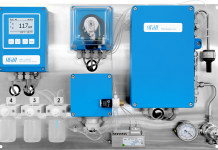A project is under way to develop a novel method for the continuous production of a range of market-leading surfactants.
The Teesside-based Centre for Process Innovation (CPI) is working with speciality chemical manufacturer Croda Europe, NiTech Solutions and The University of Cambridge’s Institute for Manufacturing on the collaborative research and development project. The two year Innovate UK project will design, build and trial a modular unit based on NiTech’s patented continuous oscillating baffled reactor (COBR) technology. Its aim is to deliver a new process for the manufacturing of existing products that significantly improves operational and capital costs, as well as process sustainability, without impacting product quality.
The collaboration will establish technical and commercial viability of the NiTech technology in Croda’s proposed applications, thus reducing the risk attached to future investment into the technology by Croda. The consortium’s members believes that the reduction in operational costs, combined with reduced capital requirements will position the UK as a global leader in the use of this technology. The University of Cambridge’s Institute for Manufacturing will provide expertise in analysing the business model for the full scale commercial adoption of these flexible manufacturing techniques. CPI will provide specialist capability and knowledge in the area of COBR technology. James Birbeck, Lead Process Engineer at Croda Europe, said: “We are excited about the potential enhancements that the technology being developed could give to our products, ensuring that we continue to be flexible in order to deliver high quality products when our customers require them.
“The consortium partnership of ourselves with CPI, NiTech Solutions and the University of Cambridge’s Institute for Manufacturing combines exceptional expertise and knowledge to deliver a technically advanced solution for a more sustainable process of manufacturing our surfactants.”
Will Barton, a director at NiTech Solutions, said: “NiTech is delighted to be working together with the project partners with the objective of demonstrating further the commercial potential of its COBR technology applied specifically to meeting the business needs of Croda Europe, whilst also highlighting the ability of the technology to enable new business models including distributed manufacturing.” Sarah Williams, Project Manager at CPI, said: “The project combines world class capability in the process scale up of COBR technology and is providing the environment for the consortium to scale up the technology.” The Centre for Process Innovation is a UK-based technology innovation centre and part of the High Value Manufacturing Catapult.
Student clinches research funding to take her to Japan
A Chemistry PhD student has been awarded a Royal Society of Chemistry Researcher Mobility Grant. Colette Whitfield, currently in her third year of her PhD, will travel to Hokkaido University, Japan, in May to work for eight weeks with Professor Ijiro and his research group.
Focusing on chemical nanoscience, the visit will see Colette combine the scientific methods that synthesise a novel DNA block copolymer, which can undergo modifications to produce a semiconductor junction or conducting nanowire.
Honour for Paul
Professor Paul O’Brien FRS FRSC, of Manchester University’s School of Chemistry, has been awarded a CBE for services to science and engineering. As well as being a leading member of the Royal Society of Chemistry’s Council for many years, he was elected as a fellow of the Royal Society in 2013.
Specialist plant project
The Teesside-based Centre for Process Innovation and nine European partners are collaborating in the design, scale-up and build of a high energy ball-mill pilot plant for the production and validation of nanostructured powders. The powders will be used in a number of manufacturing applications such as cutting tools, medical implants and a range of aerospace and automotive components.
The work is part of a four-year European research and development project titled PilotManu, which began in 2013 and is due for completion in September 2017.
Grant awarded to team
A team including researchers from the Universities of Glasgow, Edinburgh and Newcastle have been awarded a £1.6M EPSRC grant to study the effect of pressure on molecule-based magnets.
The five-year grant will support a team which has expertise in organic and inorganic synthesis, magnetism, crystallography, spectroscopy, physics and extreme-conditions engineering.











